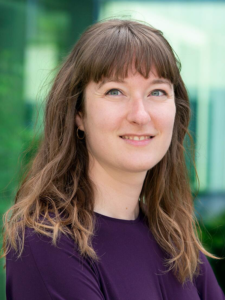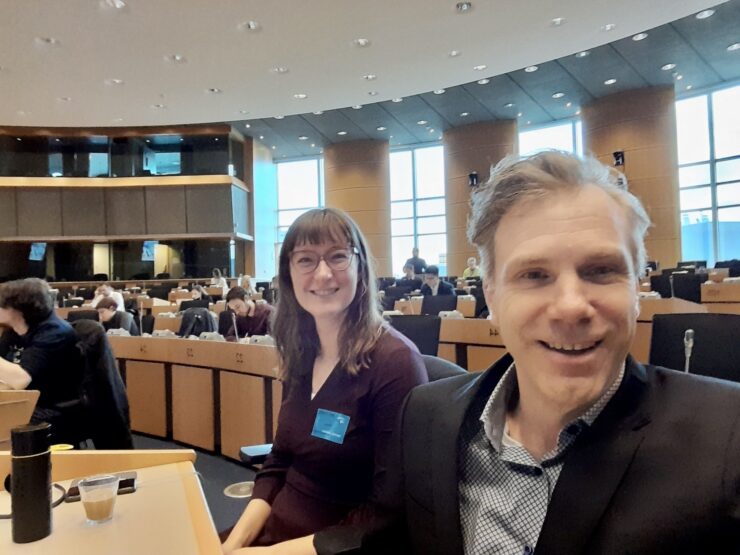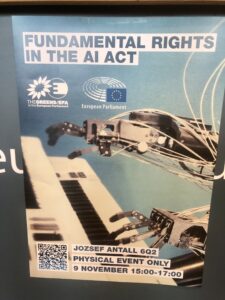Data School as ethical guide for the digital government
Iris Muis has just returned from a trip to the European Parliament, where she presented the Fundamental Rights & Algorithms Impact Assessment (FRAIA) together with Mirko Schäfer from Data School. Muis: ‘Organizations are increasingly using algorithms to make work more efficient and to hire fewer people. But if you use technology, you also have a responsibility.’

After a bachelor’s degree in law, Iris Muis followed a master’s degree in Conflict Studies and Human Rights. There she became fascinated by the digitization that is making its advance in the world. After all, isn’t digitization just as important a global event as the other developments discussed within her master’s? And doesn’t power play just as big a role in this? Muis has been working for Data School for seven years now, where she has been team leader since September of this year. The Centre for Digital Humanities (CDH) spoke to her about the FRAIA and the developments within Data School.
What exactly does the FRAIA entail?
‘Algorithms and artificial intelligence (AI) are increasingly used within the government and there is a need to monitor this development better. Look for example at what happened during the Dutch childcare benefits scandal (Toeslagenaffaire). In 2020, there was therefore a general request from the Dutch Ministry of the Interior to develop an impact assessment for AI. With a four-person team of Mirko Schäfer (co-founder Data School), Janneke Gerards (Professor of Fundamental Law), Arthur Vankan (digital technology consultant) and I, we wrote a proposal. Our proposal was selected and we then developed the Fundamental Rights & Algorithms Impact Assessment, or FRAIA for short, and IAMA in Dutch. The development proceeded quickly, because we already had experience with such an instrument: when the field of data ethics was just emerging, we developed The Ethical Data Assistant (DEDA) within Data School in 2015. When the prototype of the FRAIA was ready, we took four months to test it very intensively in practice with a number of government organisations.’

Where does the FRAIA stand now?
‘A motion has been tabled in the Dutch House of Representatives to make the FRAIA mandatory for all government algorithms, and it has been passed. So it’s already made an incredible amount of impact. That shows how great the need for this instrument is.’
Where does the European interest in the FRAIA come from?

‘An AI Act is coming up next year for European regulations on artificial intelligence. This will probably also include a Human Rights Impact Assessment. The Greens organized an event to collect input for the negotiations on this AI Act. In panels, all kinds of people from NGOs, the business community and the academic world discussed human rights and AI. GroenLinks member of the European Parliament Kim van Sparrentak invited us to tell how the FRAIA is used in the Dutch context. The success of the FRAIA in the Netherlands gives The Greens more negotiating power. It would of course be great for us if our Impact Assessment were used in the AI Act.’
Out of what necessity was Data School founded in 2013?
‘Within the Department of Media & Culture Studies (MCW), students asked for more digital humanities. At that time, the studies within MCW focused on digital culture, but did not conduct research into what really happened on online media platforms. To fill this vacuum, Mirko Schäfer and student Thomas Boeschoten organized a New Media practical. But to do real research, more teaching time was needed and MCW couldn’t afford that. So then the need arose to look for external partners who contributed financially. That turned out to be a formula for success. Because those partners in turn provided societal relevant research questions and data, which actually enabled us to conduct much more relevant and impactful research. And that is how one workshop has grown into the education and research platform that Data School is now with a team of 10 to 15 people.’
In that respect, you are really a forerunner in working with social partners.
‘Correct. Utrecht University is now focusing much more on this and it is included in the Strategic Plan. But that is a new movement.’
What is it like to work with so many social partners?
‘We’ve been doing it for so long that it’s business as usual for us. One thing though we’ve had to learn, is that we always have to take into account two important factors. Something practical must come out of the research with the partner – a report, workshop or guide – that can be used immediately by that partner. But then, after the collaboration, we have to translate that into academic output. So we always have to do some extra work after the contract, and that sometimes presents a real challenge because that partner only finances its own research project.’
How has Data School developed over the past 9 years?
‘In the beginning we only did data research. In recent years, we expanded our focus to data ethics. During our research with the external partners, we quickly encountered boundaries, or which we thought should be boundaries, and from there the need for some kind of framework on data ethics arose.’
Since last year, Data School has officially become part of the Centre for Digital Humanities (CDH). How can the two enrich each other?
‘We are very happy with this move because we are well matched in terms of scientific overlap and the competences of the employees. Where we as Data School can further strengthen the CDH, is our knowledge of valorisation, the impact we achieve in society in collaboration with our partners. What the CDH can bring us in turn is a solid base from which we can continue to grow, and in which we can exchange knowledge and skills. We often send our employees to the training courses of the CDH and our employees also teach in CDH staff workshops. Because of this substantive overlap, we can work very well together.’
Interested in more? You can find the FRAIA here.

